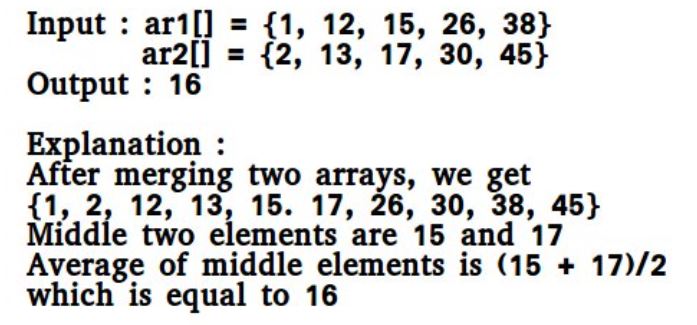There are 2 sorted arrays A and B of size n each. Write an algorithm to find the median of the array obtained after merging the above 2 arrays(i.e. array of length 2n). The complexity should be O(log(n)).

Algorithm :
1) Calculate the medians m1 and m2 of the input arrays ar1[]
and ar2[] respectively.
2) If m1 and m2 both are equal then we are done.
return m1 (or m2)
3) If m1 is greater than m2, then median is present in one
of the below two subarrays.
a) From first element of ar1 to m1 (ar1[0...|_n/2_|])
b) From m2 to last element of ar2 (ar2[|_n/2_|...n-1])
4) If m2 is greater than m1, then median is present in one
of the below two subarrays.
a) From m1 to last element of ar1 (ar1[|_n/2_|...n-1])
b) From first element of ar2 to m2 (ar2[0...|_n/2_|])
5) Repeat the above process until size of both the subarrays
becomes 2.
6) If size of the two arrays is 2 then use below formula to get
the median.
Median = (max(ar1[0], ar2[0]) + min(ar1[1], ar2[1]))/2
Examples :
ar1[] = {1, 12, 15, 26, 38}
ar2[] = {2, 13, 17, 30, 45}
For above two arrays m1 = 15 and m2 = 17 For the above ar1[] and ar2[], m1 is smaller than m2. So median is present in one of the following two subarrays.
[15, 26, 38] and [2, 13, 17]
Let us repeat the process for above two subarrays:
m1 = 26 m2 = 13.
m1 is greater than m2. So the subarrays become
[15, 26] and [13, 17]
Now size is 2, so median = (max(ar1[0], ar2[0]) + min(ar1[1], ar2[1]))/2
= (max(15, 13) + min(26, 17))/2
= (15 + 17)/2
= 16
Implementation :
// A divide and conquer based
// efficient solution to find
// median of two sorted arrays
// of same size.
#include< bits/stdc++.h >
using namespace std;
/* to get median of a
sorted array */
int median(int [], int);
/* This function returns median
of ar1[] and ar2[].
Assumptions in this function:
Both ar1[] and ar2[] are
sorted arrays
Both have n elements */
int getMedian(int ar1[],
int ar2[], int n)
{
/* return -1 for
invalid input */
if (n <= 0)
return -1;
if (n == 1)
return (ar1[0] +
ar2[0]) / 2;
if (n == 2)
return (max(ar1[0], ar2[0]) +
min(ar1[1], ar2[1])) / 2;
/* get the median of
the first array */
int m1 = median(ar1, n);
/* get the median of
the second array */
int m2 = median(ar2, n);
/* If medians are equal then
return either m1 or m2 */
if (m1 == m2)
return m1;
/* if m1 < m2 then median must
exist in ar1[m1....] and
ar2[....m2] */
if (m1 < m2)
{
if (n % 2 == 0)
return getMedian(ar1 + n / 2 - 1,
ar2, n - n / 2 + 1);
return getMedian(ar1 + n / 2,
ar2, n - n / 2);
}
/* if m1 > m2 then median must
exist in ar1[....m1] and
ar2[m2...] */
if (n % 2 == 0)
return getMedian(ar2 + n / 2 - 1,
ar1, n - n / 2 + 1);
return getMedian(ar2 + n / 2,
ar1, n - n / 2);
}
/* Function to get median
of a sorted array */
int median(int arr[], int n)
{
if (n % 2 == 0)
return (arr[n / 2] +
arr[n / 2 - 1]) / 2;
else
return arr[n / 2];
}
// Driver code
int main()
{
int ar1[] = {1, 2, 3, 6};
int ar2[] = {4, 6, 8, 10};
int n1 = sizeof(ar1) /
sizeof(ar1[0]);
int n2 = sizeof(ar2) /
sizeof(ar2[0]);
if (n1 == n2)
cout << "Median is "
<< getMedian(ar1, ar2, n1);
else
cout << "Doesn't work for arrays "
<< "of unequal size";
return 0;
}